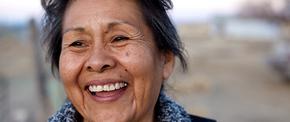The views expressed in our content reflect individual perspectives and do not represent the authoritative views of the Baha'i Faith.
With capitalism and materialism running rampant, people often seem to dole out their respect based on how much money someone has, or how famous they or their parents are. It frustrates me because we are all spiritual beings. Every human soul has something to give, and we all deserve to be loved.
RELATED: Battling Bias Where it Begins: In Ourselves
All faiths teach us to be kind to everyone, no matter their background or circumstances. But what would a world that’s so loving and inclusive really look like?
The example I look to is my mom. She treated everyone who entered the house as her child. She accepted everyone. The color of their skin, their religion, and what family they came from didn’t matter. She made everyone feel comfortable because she accepted them for who they were, and they knew they could trust her.
My mom didn’t have a lot, but she shared everything. She lived in a house with just two rooms — a big living room and a bedroom. There were migrant girls from other countries who were working in the bars in our town, but sleeping outside because they were so poor. My mom would go to the bars where they worked to tell them they did not need to sleep outside. She offered her home so they had a place to stay, even though sometimes dozens of people would sleep in her living room. When a new girl moved in, she would ask her other guests to please move a bit to make room for one more. She didn’t take rent. She would let people stay as long as they wanted. She even cooked for them. And she never asked for anything in return.
One day she saw a mother in the street who was giving every morsel of food she had to her children. Without a word, my mom went to buy food for her. Everyone in the neighborhood called her “Mommy”. Her love was full of sacrifices, and that’s how you knew she was giving from her heart.
I have never met anyone else like her. She’d give her clothes away. If she had $5 she’d give $4 away. After I moved to the United States, I would ask her why she was out of money, even after I sent her some. She said not to worry. She was taking care of plenty of kids. She believed that whatever good she did would get back to me. Even when she was dying, she told us which of her clothes should go to which needy families in our neighborhood.
My mother was my personal example of what love looks like, but these kinds of stories exist in every religion as well. In the Baha’i Faith, we have many stories of Abdu’l-Baha, the son of Baha’u’llah, the prophet and founder of the Baha’i Faith. He once said, “To be a Baha’i simply means to love all the world; to love humanity and try to serve it; to work for universal peace and universal brotherhood.”
In one story, a friend sent Abdu’l-Baha some fur so that Abdu’l-Baha could have a good warm coat. Instead of making a coat for himself, he had it cut up to make 20 caps for the elderly men of the town.
In another story, Abdu’l-Baha was in Paris, giving talks about the Baha’i Faith and its principles. His hosts arranged for him to stay in a hotel. The story goes that one of the people who visited him was a poor black man who loved Abdu’l-Baha very much. One day when this man came to visit Abdu’l-Baha, someone told him that the hotel management did not want him there because his presence was not consistent with the “standards” of the hotel. The poor man went away.
When Abdu’l-Baha heard of this, he sent for the person responsible and ordered him to find his friend who was so rudely turned away. Abdu’l-Baha said, “I did not come to see expensive hotels or furnishings, but to meet My friends. I did not come to Paris to conform to the standards of Paris, but to establish the standard of Baha’u’llah.”
I wish we would all try to live as Abdu’l-Baha did. That’s why I want our children to take classes on unity and love. Regardless of what religion someone belongs to, we all need to practice the love and kindness that our various faiths ask of us. We all need to learn an inclusive kind of love.
RELATED: Children’s Classes: A Place to Foster Learning, Communication and Unity
I’m sure these kinds of classes would have to start when children are small, maybe 5-years-old. I believe that if we start teaching those virtues at a young age, and practicing them in our communities, we can really transform our world. I know many times people preach about things they don’t practice. But if we make it a habit when we meet people, to see them for who they are and love them for who they are, then our communities will flourish.
All of us can make a difference in our community, no matter how small. You can listen to someone. You can support someone who’s going through hardship. You can make an impact by helping a friend in need. And that person can take that love and share it with others — not just people in your religious community. Be open and have conversations with others. Reach out and create true bonds of friendship that nurture a true communion of spirits and souls. When you truly reach for God in your heart, soul, and mind, I believe God will put it in your heart to love all people genuinely.
I apply this to myself, too. I give people money when I meet them, but I always make an effort to give people my attention and my warmth. When you are sincere, when you approach anyone in this world with the right energy and intentions, they will feel it. You smile. You talk to them with an open heart, one soul to another. It can be as simple as giving a compliment. You just speak to them with the intention of building a bond or sharing a laugh.
This physical life we’re living will end one day. Your legacy will not just be how much money you pass on to others. Mostly it will be the number of lives you touched with your kindness, and how you made people feel. When my mother passed, I was amazed at how many people came to her funeral, and how many people called the family with stories of how she helped them. I saw what an incredible legacy she left, and I knew that was the kind of legacy to strive for.
Wouldn’t it be wonderful if all humanity embodied God’s message? Not just talk the talk but also walk the walk by loving genuinely and making a difference in people’s lives. Baha’u’llah wrote, “Let deeds, not words, be your adorning.”
True worship is service to humanity — not spending many hours in places of worship. This is the way I think we can have a world that is inclusive and loving. At the end of the day, all religions are speaking the same language of love and kindness. All we have to do is put it into action. I don’t want us to merely talk about the Golden Rule. I want us to live it.
This has to start in our places of worship. We can heal our society of all this division and hate and lead by example. Jesus emphasized love and concern for the needy. Baha’u’llah emphasized the equality of women and men, the unity of all religions, and an end to prejudices of all kinds. These teachings are what we need in the world right now.
















Comments
Sign in or create an account
Continue with Googleor